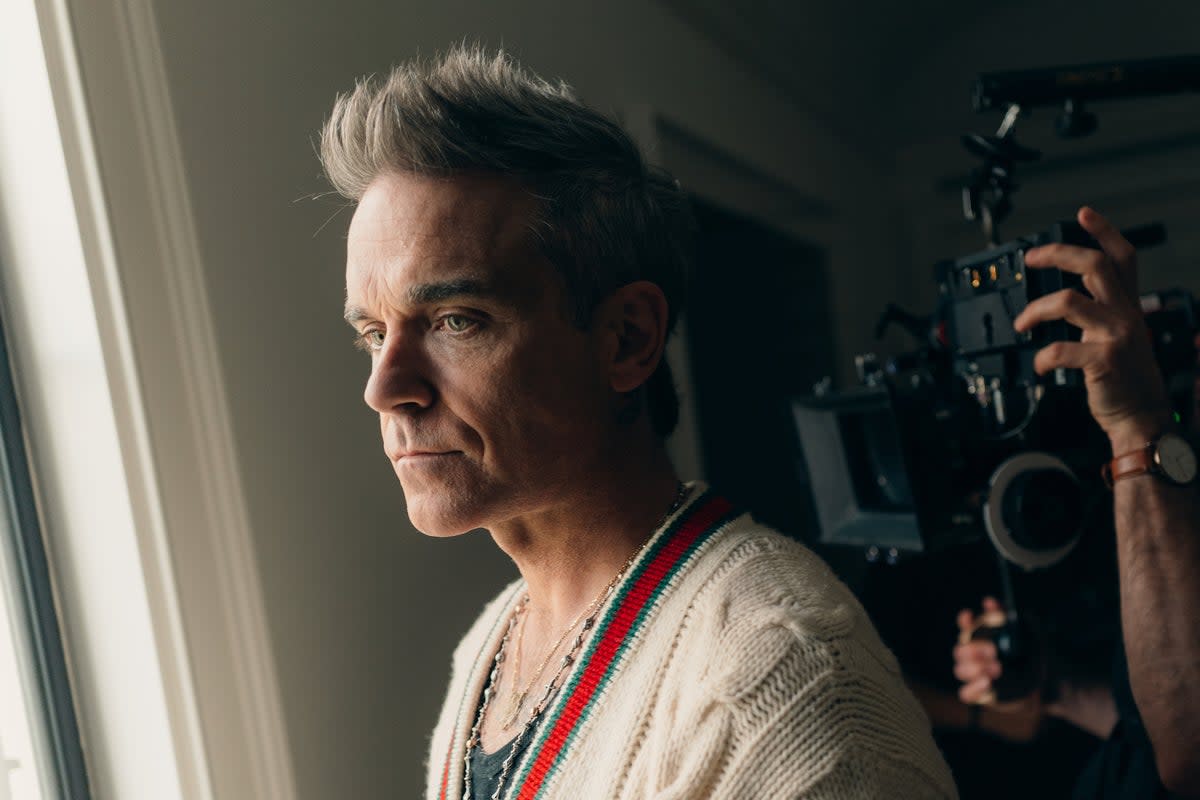Robbie Williams on Netflix review: British icon narrates an astounding life story from under his duvet

If the true legacy of a pop act is measured not in continued record sales or Spotify streams, but in how frequently their songs are drunkenly belted out in karaoke bars or pubs after football matches, then there are few superstars like Robbie Williams. From “Angels” and “Millennium” to “Rock DJ” and “Feel”, the impish charisma of Stoke-on-Trent’s favourite son is still remembered and adored more than 20 years on. But Robbie Williams, Netflix’s new four-part docuseries on the musician, tells a different story: one of addiction, despair, and ultimately, reconciliation.
His is the tale of a 16-year-old kid who joins a boy band (Take That) only to end up performing routinely in front of 90,000 fans hopped up on a cocktail of drugs and alcohol. It is a familiar story of fame, excess and a late-in-life descent into civilised domesticity. “If I’m not on stage,” Williams says. “I’m in bed.” No lie: Williams narrates much of his story from beneath a duvet. Swaddled in a protective armour of goose down and Egyptian cotton, he recounts a retrospective fuelled by self-castigation (he calls his show “end-of-the pier-nonsense”) and a futile search for credibility (“I want to write ‘Karma Police’ and I’m writing ‘Karma Chameleon’,” he says of “Rock DJ”).
Williams is such a distinctively British phenomenon. When he attempted to invade the USA, as the UK’s biggest acts like The Beatles and The Rolling Stones had done, he bombed. Indeed, his home in Los Angeles, where he still resides, became a place of sanctuary; somewhere he could escape the paparazzi. “What I needed from America wasn’t to break it,” says Williams. “It was to heal me.” Semi-handsome, semi-grotty, semi-artist, semi-cruise singer, semi-intellectual, semi-yob: Williams was never quite polished enough for the perma-tan and perfect teeth of California.
He never did make it as a transatlantic icon, but Robbie Williams feels like an international production. It is the debut unscripted offering from Ridley Scott’s RSA Films, executive produced by Asif Kapadia (whose films like Amy and Maradona are aesthetically influential here) and directed by Joe Pearlman, who helmed the acclaimed Bros documentary (2018’s Bros: After the Screaming Stops) as well as a more recent portrait of Scottish crooner Lewis Capaldi. In the world of music documentaries (an increasingly lucrative world, apparently), they’re all more Gary Barlow than Howard Donald.
While Robbie Williams is undoubtedly a PR exercise (as, it should be said, most shows of its ilk are) there is enough texture in the patina to make it work. The glossy surface of the manufactured modern pop story, from Taylor Swift to Ed Sheeran, is absent here. “You’ll be able to watch the documentary when you’re older,” he tells his 10-year-old daughter, Teddy. And that’s a good thing, because there is a rawness to the archival footage, which features Williams drunk, high, being injected with steroids, canoodling with Geri Halliwell, and leading vast crowds in mass swear-alongs. Williams is altogether more “Rudebox” than “Angels”; more Stoke-on-Trent than Hollywood. But there is catharsis along the way. “I can stick a pin in this now and move on,” says Williams as finally, he gets out of bed and heads off on yet another international tour.
It would be easy to make a joke about a bloke from the Potteries being a bit fragile, but Robbie Williams is a tender portrait of a genuine British sensation. Admittedly, it may end up just another instalment in Netflix’s hagiographic portraits of English icons, from David Beckham and Tyson Fury to George Michael and Keith Richards, but its attempt at self-examination, if a little arch, is an effective way of looking at the excesses and intrusions of celebrity at the turn of the millennium. Robbie Williams combines titillation and pity as effectively as its namesake does braggadocio and vulnerability.


